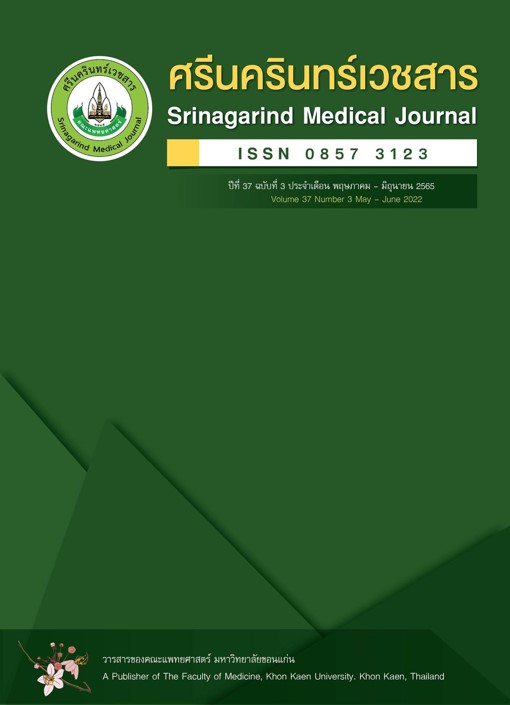The Effect of Applying a Chronic Care Model in Patients with Uncontrolled Hypertension and Type 2 Diabetes Mellitus on Delaying Chronic Kidney Disease Progression in Primary Care, Ubon Ratchathani Province
Abstract
ผลของการประยุกต์ใช้รูปแบบการดูแลโรคเรื้อรังในผู้ป่วยโรคความดันโลหิตสูงและโรคเบาหวานชนิดที่ 2 ที่ควบคุมไม่ได้เพื่อชะลอโรคไตเรื้อรังในหน่วยบริการปฐมภูมิ จังหวัดอุบลราชธานี
ภากรณ์ หอมจำปา,1 วราทิพย์ แก่นการ2*
1 โรงพยาบาล 50 พรรษา มหาวชิราลงกรณ์
2คณะพยาบาลศาสตร์ มหาวิทยาลัยราชภัฏอุบลราชธานี
หลักการและวัตุประสงค์: ผู้ป่วยโรคความดันโลหิตสูงและโรคเบาหวานที่ควบคุมไม่ได้มีความเสี่ยงสูงต่อเกิดโรคไต การศึกษาครั้งนี้มีวัตถุประสงค์เพื่อศึกษาผลของการประยุกต์ใช้รูปแบบการดูแลโรคเรื้อรังในผู้ป่วยโรคความดันโลหิตสูงและโรคเบาหวานชนิดที่ 2 ที่ควบคุมไม่ได้เพื่อชะลอโรคไตเรื้อรังหน่วยบริการปฐมภูมิ
วิธีการศึกษา: การศึกษาครั้งนี้เป็นแบบทดลองมีกลุ่มควบคุม กลุ่มตัวอย่างเป็นผู้ป่วยโรคความดันโลหิตสูงและเบาหวานชนิดที่ 2 ที่ควบคุมไม่ได้ในหน่วยบริการปฐมภูมิ และคัดเลือกโดยการสุ่ม แบ่งเป็นกลุ่มทดลองและกลุ่มควบคุมกลุ่มละ 50 ราย ประยุกต์ใช้รูปแบบการดูแลโรคเรื้อรังติดตามผล 8 เดือน ประกอบด้วย การดูแลแบบทีมสหสาขาวิชาชีพ จัดระบบฐานข้อมูลการแจ้งเตือนปัญหาผู้ป่วยรายกรณี การให้ความรู้และสร้างทักษะเพื่อการจัดการตนเอง และติดตามเยี่ยมทางออนไลน์ ประเมินผลโดยใช้แบบวัดพฤติกรรมการจัดการตนเองเพื่อชะลอโรคไตเรื้อรัง ผลลัพธ์ทางคลินิก และแบบวัดคุณภาพชีวิต วิเคราะห์ข้อมูลโดยใช้สถิติเชิงพรรณ ไคสแควร์และสถิติทีที่เป็นอิสระต่อกัน
ผลการศึกษา: ภายหลังการทดลองพบว่า กลุ่มทดลองมีคะแนนเฉลี่ยพฤติกรรมการจัดการตนเอง อัตราการกรองของไต และคุณภาพชีวิตเพิ่มขึ้น และความดันโลหิต ฮีโมโกลบินเอวันซีต่ำกว่ากลุ่มควบคุมอย่างมีนัยสำคัญทางสถิติ (p< .05)
สรุป: รูปแบบการดูแลโรคเรื้อรังทำให้พฤติกรรมการจัดการตนเอง ผลลัพธ์ทางคลินิก และคุณภาพชีวิตของผู้ป่วยโรคความดันโลหิตสูงและเบาหวานชนิดที่2 ที่ควบคุมไม่ได้ดีขึ้น
Background and Objective: Patients with uncontrolled hypertension (HT) and type 2 diabetes (T2D) increases risk for kidney disease. The purpose of this study was to study the effect of applying a chronic care model in patients with uncontrolled hypertension and diabetes mellitus on delaying chronic kidney disease progression in primary care.
Methods: This study was a randomized controlled trial. The sample consisted of patients with uncontrolled HT and T2D in primary care and selected by random. They were divided into experimental group and control group of 50 persons each. A chronic care model was applied for 8-month follow-up. The intervention included caring by multidisciplinary team, database for patient problem on case management, educating and building skills for self-management. Evaluated by using the self-management behavior scale to delay chronic kidney disease, clinical outcomes, and quality of life measure. Data were analyzed using descriptive statistics. chi square and independent t-test.
Results: At the end of the study, the experimental group had statistically significant higher score of self-management behavior, glomerular filtration rate and quality of life and had statistically significant lower blood pressure level and HbA1c than the control group (p<.05).
Conclusion: Chronic disease care model affects self-management behaviors, clinical outcomes, and quality of life of patients with uncontrolled HT and T2D improved.


